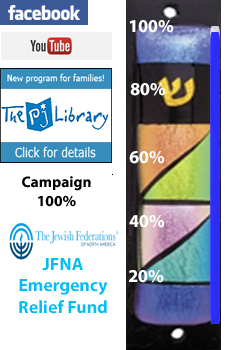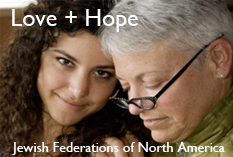Twenty-eight years ago I was a rookie rabbi, still wet behind the ears with a full head of hair. I’d been serving in the rabbinate less than twelve months when word went out that the Jewish community was about to mark a unique event called Birkat Hachamah, literally, “the Blessing of the Sun.” Since this event only occurs once in twenty eight years, I realized I hadn’t even been born the last time it was observed, and in 1981 there was not nearly as much hoopla and hype as there appears to be in 2009.
Being an enthusiastic young rabbi, I was excited about observing Birkat Hachamah with my new congregation. And so, at sunrise on Wednesday morning, April 8th, 1981 a small group of people came together in Knoxville , Tennessee to mark the cycle of the sun. We read psalms, sang El Adon and listened to a recording of the Beatles hit, “Here comes the sun, little darling, here comes the sun, it’s alright…” After all, I may have been the bearer of an ancient tradition but I was also a product of the ‘Age of Aquarius.’ Don’t we teach ‘tradition and change?’ Like any meaningful ceremony I felt it was important to have something new and something old.
This coming Wednesday Jewish people around the world will once again celebrate Birkat Hachamah. Looking around I realize that the world has changed and that I’m older, hopefully a little wiser and certainly a lot balder. In 1981 I was the father of a beautiful newborn son, our first child; in 2009 we have three adult children. In 1981 I could not imagine what the future held for me or for the world. Looking back, I stand in awe of the changes and events that I’ve witnessed in my life time: from wars, disease, and natural disasters to advancements of technology, pioneering vistas in medicine, and of course the computer and the cell phone.
And yet the world hasn’t really changed at all. Wednesday the sun will return to the same place in the sky as it was at the moment of creation. Never mind that I don’t believe the world is only 5769 years old, or that it was created exactly the way it is described in Genesis. Birkat Hachamah is more about poetry than science. It’s an opportunity to step away from the humdrum and the ordinary and experience a sense of wonder in the every day. It is a chance to acknowledge the gifts we take for granted. And it’s an opportunity that won’t come along again for another twenty eight years. In other words, to allow this moment to pass unmarked is to miss a unique opportunity.
So what exactly is Birkat Hachamah? It is a little complicated but here are the basics. Based on the idea that a solar year is 365.25 days long (that’s the time it takes the earth to circle the sun), the sages calculated that the sun would return to the same place in the sky as it was at the moment of creation every twenty eight years. Since the sun and the moon were created on the fourth day of creation Birkat Hachamah always occurs on a Wednesday.
Unfortunately, these calculations are complicated by the fact that actually the solar cycle is not 365.25 years long (its closer to 365.24682 days or 8.71 minutes shorter) and that the Julian calendar which was used in the west for 1500 years was recalculated by Pope Gregory some five hundred years ago. As a result these calculations are actually not correct. Birkat Hachamah should have occurred eighteen days ago on March 20th, on the vernal equinox. Tradition apparently trumps astronomy and we continue to mark this special moment every twenty eight years based on the calculations of the Talmudic sage, Shmuel.
But all of this is really beside the point. Birkat Hachamah is not about astronomy or science or math. It is about the human spirit. It is about experiencing a sense of wonder. Sure, like any Jewish ceremony we have to observe this ceremony at a particular moment in time, a moment determined by the sages and tradition, but that has more to do with our ability to share this experience than it does with history or any other scientific calculations. Until we can all sit down together in one room and recalculate the Jewish calendar, we will continue to mark Birkat Hachamah based on tradition rather than the sky.
But all of this raises some serious questions for us. What does tradition really mean? Is tradition based on some objective reality? Why bother observing such traditions if they are based on myth and incorrect assumptions. Several years back Rabbi David Wolpe gave a sermon on the first day of Passover in which he suggested that there was no ‘historical evidence’ for the story of the Exodus outside the Bible. His sermon was so controversial that it reverberated across the country and found its way into the press and magazines, both Jewish and non Jewish. For a rabbi to suggest that the Exodus did not occur is like a Christian minister saying there is no Santa Claus! Of course Rabbi Wolpe wasn’t suggesting that we shouldn’t observe Passover; rather he was arguing that the criteria of science and history might have little to do with the realities of our spiritual life; that we choose to observe rituals even if the events upon which they are based are not historically correct.
Sometimes we have a hard time making a distinction between what is correct and what is true. We presume that if something is incorrect than it must not be true. Because the details of a certain event are not correct doesn’t mean that it doesn’t contain a greater truth for our lives or a greater meaning for the world.
We do not observe Birkat Hachamah on the correct day – no one argues with that fact. But that does not make the truth of this ceremony any less meaningful or powerful for us. But what are those truths?
- One: God is our creator even if we can’t discern the full meaning or process of creation.
- Two: The sun is a gift which gives us life each day; we cannot live without it.
- Three: We have a responsibility not only to celebrate God’s gifts but to be their custodians.
- Four: God’s gifts belong to all of us and we must learn to share them.
- And five: Because something is always there doesn’t make it any less of a miracle.
As I recite Birkat Hachamah Wednesday morning I’ll be thinking about all of these truths even if this not really the correct day or if creation didn’t happen quite the way our ancestors believed it happened. But even more, I’ll be thinking about the gift of having lived these twenty eight years and witnessed all the things that I’ve witnessed. I’ll meditate on what the next twenty eight years may hold for me and the world. Every berachah, every blessing we recite in our tradition is an opportunity that only exists for a brief moment – and if we let it escape, it is gone forever.
Rabbi Jerachmiel Israel Danziger, the Hasidic author of the Yismach Yisrael Haggadah commentary, puts it this way: “There are only three moments in time: past, present and future. The past is no more and the future is beyond our sight. The only moment that matters in this one; the only moment that exists in reality is the present moment.” Ritual, I would suggest, is about living fully in the present moment, it is sanctifying this moment and savoring its uniqueness. There is so much we sleep or ignore in our daily lives; there are so many experiences which pass us by without our even realizing it. Ritual is about consciousness, being totally awake to the presence of God and the wonder of creation.
And as we sit down at the Seder on Wednesday night, we will say, “Each person is obligated to see him/herself as if he/she went forth from Egypt .” Yet how can we see ourselves as if we experienced something that may (or may not) have happened thousands of years ago. The sages understood that we experience the Exodus not as an event in the distant past. It’s happening now. We taste the bitterness of slavery; we experience the haste with which our ancestors fled from Egypt ; we say ‘no’ to slavery and the idolatry. These are not just historical facts – they are not just things that happened. They will happen again and again. They are existential truths that exist right now. Redemption is not something that happened but something that is still taking place in every moment of our lives.
So Wednesday is a powerful and sacred moment in Jewish time. We will experience the glory of creation and triumph of redemption. We will serenade the sun and sing songs of praise to the God who continually brings us out of Egypt . The truth of these experiences is undeniable.
And this is our challenge at the Passover of Seder: it is our job not just to go through the Haggadah but to make sure the Haggadah goes through us. Reb Zalman Schachter-Shalomi describes the Passover Haggadah as a recipe book not meant to be read from cover to cover, but which we should use to give ta’am, to give taste and meaning to our spiritual lives. It is our challenge not just to tell the story of the Exodus but to live it and feel it and think about it in such a way so that it influences the way we live all year long.
So my prayer for all of you is that this year you have a Zissen Pesach, a sweet Pesach but also a bitter Pesach. May you come to know the bitterness of slavery in all its forms but also the sweetness of freedom informed by responsibility and wholeness. And may God be present in all of these moments. Most of all I hope you have a meaningful Pesach in which you experience the fullness of the present moment and the transcendent truths that embrace us all.
Shabbat Shalom and Hag Sameach


